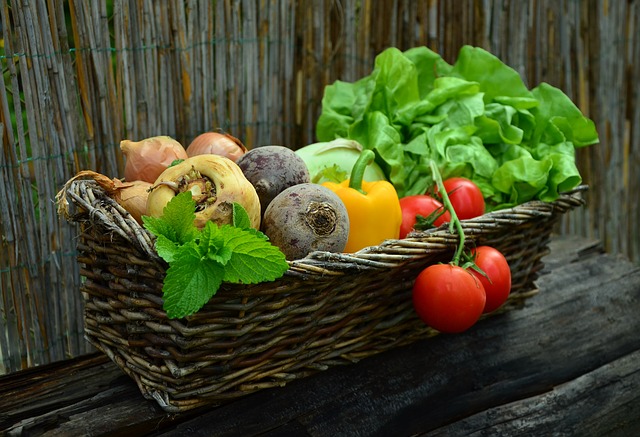Thankfully, to help you build strong bones and maintain them along as you age there are
diverse nutrition and lifestyle habits that you can adopt as part of your routine. Listed below are
the 5 natural ways by which you can build healthy bones.
1. Eating Vegetables increases Bone density
Vegetables are great for your bones as they also appear to increase what is known as
bone mineral density or bone density. Simply put, bone density is the measure of the
amount of calcium and other minerals present in your bones. This reflects in bone
conditions that are characterized by low bone density such as osteoporosis (brittle
bones) and osteopenia (low bone mass).
Studies say that even older women are benefited by eating lots of vegetables. In fact, as
per a survey conducted on 50 plus women, those who consumed onions most frequently
had a 20% lower osteoporosis risk vis-a-vis women who rarely ate onions.
In older adults, another major risk for osteoporosis is increased bone turnover, i.e., the
process of forming new bones after breaking down the older ones. It has been confirmed
in another 3-month study where women who took more than nine servings of cabbage,
broccoli, and parsley or plants that are rich in bone-protective antioxidants had a decline
in bone turnover.
2. Perform Weight-bearing exercises for New bones
Engagement in certain types of high-impact exercises for bone health like weight-
bearing or strength training exercises can promote the formation of a new bone. Besides
this, it can be highly beneficial to prevent loss of bones in older adults.
Studies in senior men and women who carried out weight-bearing exercises
demonstrated an increase in bone mineral density, bone size and strength along with
reductions in bone turnover and inflammation markers.
Similarly, strength-training exercise not just helps in increasing muscle mass but also
offers protection against bone loss in both younger and older women notwithstanding
even those who are enduring breast cancer, osteoporosis or osteopenia.
3. Get healthy bones with High-protein diets
Getting enough protein is not only crucial for well-grown muscles but also healthy bones.
Indeed, nearly 50% of your bones are made up of proteins. Researchers too claim that
low-protein intake is the reason behind decreased calcium absorption. This low calcium,
in turn, may also affect bone formation and breakdown rates.
Research findings state that older women, in particular, seem to have better bone
density when they consume large amounts of protein. Furthermore, diets carrying a
higher percentage of calories from protein will help in bone mass preservation during
weight loss. In summary, low protein intake can lead to bone loss whereas a high protein
intake can protect bone health during aging and weight loss.
4. Eat Calcium-rich Foods all through the Day!
A vital mineral for bone health, calcium is the main mineral found in your bones. Since
old bone cells are broken down and replaced regularly by new ones, it’s important to
ingest calcium every day to take care of bone structure and strength.
The RDI (or The Reference Daily Intake) for calcium is 1,000 mg per day for most
people. Though teens need 1,300 mg whereas older women require 1,200 mg, the
amount of calcium your body absorbs can differ greatly. Accordingly, if you eat a meal
that exceeds 500 mg of calcium, your body will absorb far less of it than when you
consume a lower amount.
Therefore, it’s ideal for spreading your calcium intake all over the day by embracing one
high-calcium food at each meal. It is also better to get calcium from foods rather than
sourcing them from supplements.
5. Include Foods High in Magnesium and Zinc
Calcium isn’t just the mineral for bone health. Several other minerals play a role here,
such as magnesium and zinc. Given the facts, magnesium plays a key role in
transforming vitamin D into an active form that boosts calcium absorption.
Observational studies on women show that those who consumed 400 mg of magnesium
tend to have 2 to 3% higher bone density than those who consumed half of this amount
daily. Despite being found in limited amounts in most foods, magnesium has only a few
excellent food sources. Supplementing with magnesium glycinate, citrate or carbonate
may be useful.
Required in minimal amounts, Zinc is a trace mineral that promotes the formation of
bone-building cells and restrains excessive bone breakdown. Studies also revealed how
zinc supplements support bone growth in children as well as the preservation of bone
density in older adults. The right sources of zinc comprise of beef, shrimp, flaxseed,
spinach, oysters, and pumpkin seeds.
It turns out that bone health is necessary at all stages of life. Whatsoever, people tend to take it
for granted to have stronger bones until the bone loss symptoms surface. There are different
nutrition and lifestyle habits to one’s benefit that can help to build and maintain strong bones. It’s
never too late if you start it today!
Author Bio:
Emylee is a wellness lifestyle writer. She loves sharing her thoughts and personal experiences
related to natural remedies, yoga and fitness through her writing. She currently writes for How
To Cure. She can connect with others experiencing health concerns and help them through their
recovery journeys through natural remedies.







Recent Comments